2019高考英语时态和语态练习编(含解析)
- 格式:pdf
- 大小:34.16 KB
- 文档页数:5
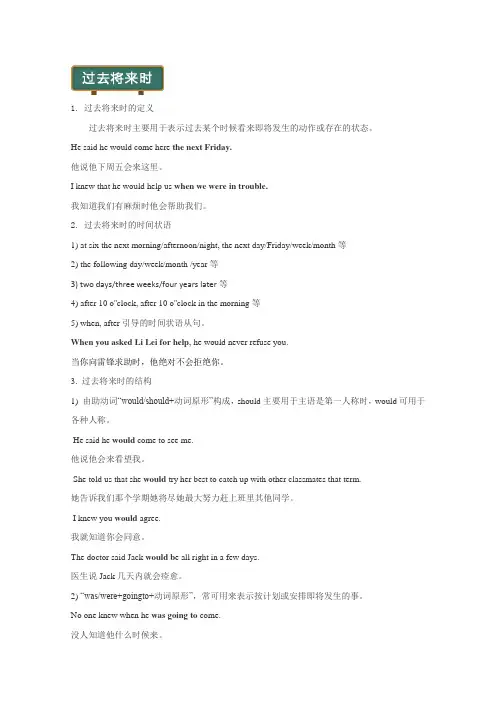
1. 过去将来时的定义过去将来时主要用于表示过去某个时候看来即将发生的动作或存在的状态。
He said he would come here the next Friday.他说他下周五会来这里。
I knew that he would help us when we were in trouble.我知道我们有麻烦时他会帮助我们。
2. 过去将来时的时间状语1) at six the next morning/afternoon/night, the next day/Friday/week/month等2) the following day/week/month /year等3) two days/three weeks/four years later等4) after 10 o''clock, after 10 o''clock in the morning等5) when, after引导的时间状语从句。
When you asked Li Lei for help, he would never refuse you.当你向雷锋求助时,他绝对不会拒绝你。
3. 过去将来时的结构1) 由助动词“would/should+动词原形”构成,should主要用于主语是第一人称时,would可用于各种人称。
He said he would come to see me.他说他会来看望我。
She told us that she would try her best to catch up with other classmates that term.她告诉我们那个学期她将尽她最大努力赶上班里其他同学。
I knew you would agree.我就知道你会同意。
The doctor said Jack would b e all right in a few days.医生说Jack几天内就会痊愈。
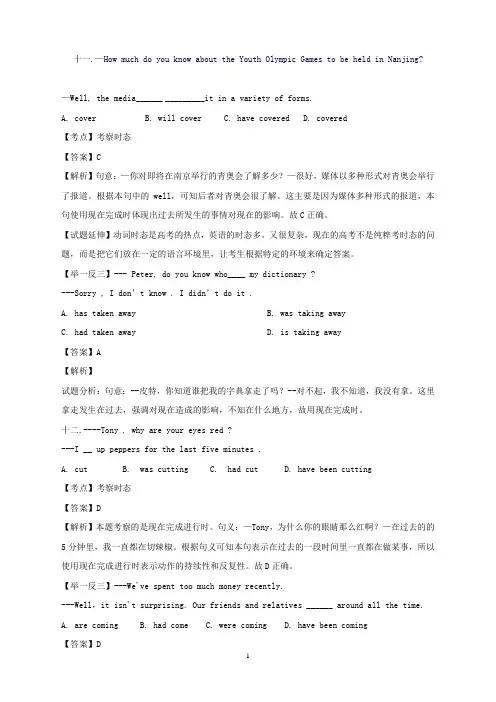
十一.—How much do you know about the Youth Olympic Games to be held in Nanjing?—Well, the media ______ _________it in a variety of forms.A. coverB. will coverC. have coveredD. covered【考点】考察时态【答案】C【解析】句意:—你对即将在南京举行的青奥会了解多少?—很好,媒体以多种形式对青奥会举行了报道。
根据本句中的well,可知后者对青奥会很了解。
这主要是因为媒体多种形式的报道,本句使用现在完成时体现出过去所发生的事情对现在的影响。
故C正确。
【试题延伸】动词时态是高考的热点,英语的时态多,又很复杂,现在的高考不是纯粹考时态的问题,而是把它们放在一定的语言环境里,让考生根据特定的环境来确定答案。
【举一反三】--- Peter, do you know who____ my dictionary ?---Sorry , I don’t know . I didn’t do it .A. has taken awayB. was taking awayC. had taken awayD. is taking away【答案】A【解析】试题分析:句意:--皮特,你知道谁把我的字典拿走了吗?--对不起,我不知道,我没有拿。
这里拿走发生在过去,强调对现在造成的影响,不知在什么地方,故用现在完成时。
十二.----Tony , why are your eyes red ?---I __ up peppers for the last five minutes .A. cutB. was cuttingC. had cutD. have been cutting【考点】考察时态【答案】D【解析】本题考察的是现在完成进行时。
句义:—Tony,为什么你的眼睛那么红啊?—在过去的的5分钟里,我一直都在切辣椒。
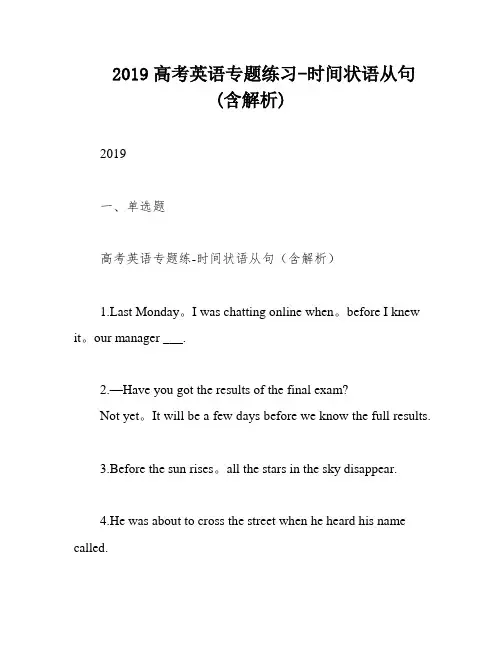
2019高考英语专题练习-时间状语从句(含解析)2019一、单选题高考英语专题练-时间状语从句(含解析)st Monday。
I was chatting online when。
before I knew it。
our manager ___.2.—Have you got the results of the final exam?Not yet。
It will be a few days before we know the full results.3.Before the sun rises。
all the stars in the sky disappear.4.He was about to cross the street when he heard his name called.5.As time goes by。
his ___ getting worse.6.—Why didn't you tell him about the meeting?He rushed out of the room before I could say a word.7.—I like your new shoes!Thanks。
I had to try on almost a dozen pairs before I decided to get them.8.___。
we have ___.9.— Did Jack come back early last night?Yes。
He arrived home before it was yet 8 o'clock.10.If you can do these things by the time you go to college。
you'll do well in the test of college life.11.While the。
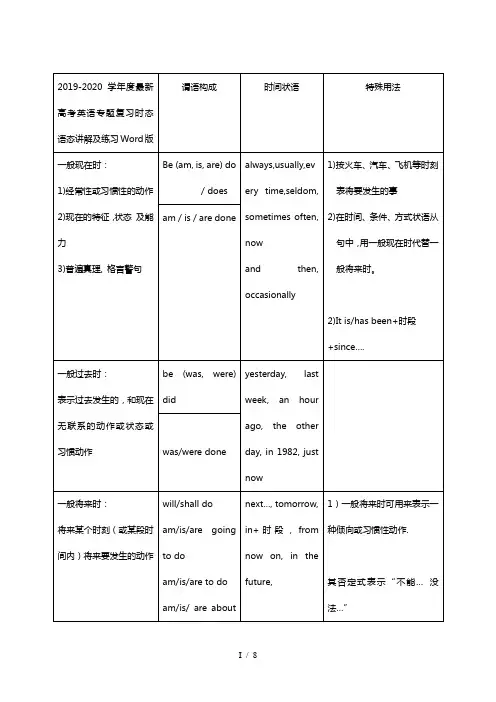
1.Selecting a mobile phone for personal use is no easy task because technology _____ so rapidly.A. is changingB. has changedC. will have changedD. will change2. I wonder why Jenny ____ us recently. We should have heard from her by now.A. hasn’t writtenB. doesn’t writeC. won’t writeD. hadn’t written3. –Excuse me, sir. Would you do me a favor?--Of course. What is it?--I ____ if you could tell me how to fill out this form.A. had wonderedB. was wonderingC. would wonderD. did wonder4. ---____David and Vicky ____ married?---For about three years.A. How long were; beingB. How long have; gotC. How long have; beenD. How long did; get5. Now that she is out of job, Lucy ____ going back to school, but she hasn’t decided yet.A. had consideredB. has been consideringC. consideredD. is going to considerA. had been working; are still workingB. had worked; were still workingC. have worked; were still workingD. have worked; are still working7. When the old man _____ to walk back to his house, the sun ____ itself behind the mountain.A. started;had already hiddenB. had started; had already hiddenC. had started; eas hidingD. was started; hid8. Scientists think that the continents ____ always where they ____ today.A. aren’t; areB. aren’t; wereC. weren’t; areD. weren’t; were9. –If the traffic h adn’t been so heavy, I could have been back by 6 o’clock.--What a pity! Tina ____ here to see you.A. isB. wasC. would beD. has been10. The country life he was used to ____ greatly since 1992.A. changeB. has changedC. changingD. have changed11. –Where did you put the car keys?--Oh, I ____ I put them on the chair because the phone rang as I ____ in.12. I have to go to work by taxi because my car ____ at the garage.A. will be repairedB. is repairedC. is being repairedD. has been repaired1. Why don’t you put the meat in the fidge?It will ____ fresh for several days.A. be stayedB. stayC. be stayingD. have stayed2. The crazy fans _____ patiently for two hours, and they would wait till the movie star arrived.A. were waitingB. had been waitingC. had waitedD. would wait3. –George and Lucy got married last week. Did you go to their wedding?--No, I ____. Did they have a big wedding?A. was not invitedB. have not been invitedC. hadn’t been invitedD. didn’t invite4. Millions of pounds’ worth of damage ____ by a s torm which swept across the north of England last night.A. has been causedB. had been causedC. will be causedD. will have been caused5. –What would you do if it ____tomorrow?--We have to carry it on, since we’ve got everything ready.A. rainB. rainsC. will rainD. is raining6.Months ago we sailed ten thousand miles across this open sea, which ____ the Pacific, and we met no storms.A. was calledB. is calledC. had been calledD. has been called7. In a room above store, where a party ____, some workers were busily setting the table.A. was to be heldB. has been heldC. will be heldD. is being held8. I ____ along the street looking for a place to park when the accident _____.A. went; was occurringB. went; occurredC. was going ; occurredD. was going; had occurredA. expectedB. was expectingC. was expectedD. would be expected10. The moment the 28th Olympic Games ____ open, the whole world cheered.A. declaredB. have been declaredC. have declaredD. were declared11. –Did you see a man in black pass by just now?--No, sir. I ____ a newspaper.A. readB. was readingC. would readD. am reading12.--____you ____him around the museum yet?--Yes. We had a great time there.A. Have; shownB. Do; showC. Had; shownD. Did; show1. The news came as no surprise to me. I ____ for some time that the factory was going to shut down.A. had knownB. knewC. have knownD. know2. By the end of last year, another new gymnasium ____ in Beijing.3. –You were out when I dropped in at your house.--Oh, I ____ for a friend from England at the airport.A. was waitingB. had waitedC. am waitingD. have waited4. –The window is dirty.--I know. It ___ for weeks.A. hasn’t cleanedB. didn’t cleanC. wasn’t cleanedD. hasn’t been cleaned5. With more forests being destroyed, huge quantities of good earth ____ each year.A. is washing awayB. is being washed awayC. are washing awayD. are being washed away7. Eliza remembers everything exactly as if it ____yesterday.A. was happeningB. happensC. has happenedD. happened8. The house belongs to my aunt but she ___ here any more.A. hasn’t livedB. didn’t liveC. hadn’t livedD. doesn’t live9. Customers are asked to make sure that they____ the right change before leaving the shop.A. will giveB. have been givenC. have givenD. will be given10. My friend, who ____ on the International Olympic Committee all his life, is retiring next month.A. servedB. is servingC. had servedD. has served11. They ____ two free tickets to Canada, otherwise they’d never have been able to afford to go.A. had gotB. gotC. have gotD. get12. At the end of the meeting, it was announed that an agreement _____.A. has been reachedB. had been reachedC. has reachedD. had reached。
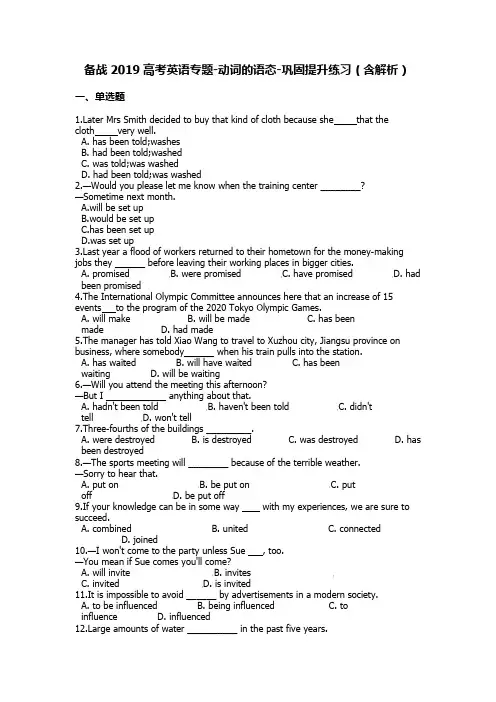
备战2019高考英语专题-动词的语态-巩固提升练习(含解析)一、单选题ter Mrs Smith decided to buy that kind of cloth because she that thecloth very well.A. has been told;washesB. had been told;washedC. was told;was washedD. had been told;was washed2.—Would you please let me know when the training center ________? —Sometime next month.A.will be set upB.would be set upC.has been set upD.was set upst year a flood of workers returned to their hometown for the money-making jobs they ______ before leaving their working places in bigger cities.A. promisedB. were promisedC. have promisedD. had been promised4.The International Olympic Committee announces here that an increase of 15 events to the program of the 2020 Tokyo Olympic Games.A. will makeB. will be madeC. has beenmade D. had made5.The manager has told Xiao Wang to travel to Xuzhou city, Jiangsu province on business, where somebody______ when his train pulls into the station.A. has waitedB. will have waitedC. has beenwaiting D. will be waiting6.—Will you attend the meeting this afternoon?—But I ____________ anything about that.A. hadn't been toldB. haven't been toldC. didn'ttell D. won't tell7.Three-fourths of the buildings _________.A. were destroyedB. is destroyedC. was destroyedD. has been destroyed8.—The sports meeting will ________ because of the terrible weather.—Sorry to hear that.A. put onB. be put onC. putoff D. be put off9.If your knowledge can be in some way with my experiences, we are sure to succeed.A. combinedB. unitedC. connectedD. joined10.—I won't come to the party unless Sue , too.—You mean if Sue comes you'll come?A. will inviteB. invitesC. invitedD. is invited11.It is impossible to avoid ______ by advertisements in a modern society.A. to be influencedB. being influencedC. toinfluence D. influencedrge amounts of water __________ in the past five years.A. were pollutedB. was pollutedC. has been pollutedD. have been polluted13.Your donation greatly appreciated and the money will be used to help the students from poor families.A. has beenB. isC. wasD. had been14.A new trading agreement _______ between Holland and Denmark.A. was drawn inB. was drawn upC. has been made upD. had been drawn up15.We won't start the work until all the preparations ________.A. are being madeB. will be madeC. have been madeD. had been made16.Ann ________ a certificate at the end of the program to show she has learned computer skills.A. will giveB. will be givenC. gaveD. was given17.—Have you moved into the new house?—Not yet. It .A. has been builtB. was builtC. is being builtD. had been built18.The life-saving drug invented in 1897, which ________ aspirin, has helped increase the standard of people's health greatly.A. was calledB. is calledC. has been calledD. had been called19.The window ________by Tom last week.A. isbroken B. broke C. breaksD. was broken20.Once environmental damage ___________, it takes many years for the system to recover.A. has doneB. is to doC. doesD. is done21.When I got to his house, I found that the walls _____ .A. are being paintedB. are paintingC. were being paintedD. were painting22.Now the world's attention ________ the stocking markets, as they have great influence on the world's economy.A. is fixing onB. is being fixed onC. has fixed onD. had been fixed on23.The little boy, along with his classmates, ________ for their bravery action intime of danger.A. were praisedB. was praisedC. havepraised D. has praised24.Finally she ___________ that Tom was guilty.A. was convinced ofB. was convincedC. convincedD. was convincing25.— Why do you look worried?— Jane left the company half a month ago. Her work ______ unfinished since.A. leftB. has leftC. has beenleft D. was left26.A new cinema _____ here. They hope to finish it next month.A. will be builtB. is being builtC. has beenbuilt D. is built27.—Are we about to having dinner?—Yes, it ________ in the dining room.A. serveB. is servingC. is being servedD. has been servinglions of pounds' worth of damage ________ by a storm which swept across thenorth of England last night.A. has been causedB. had been causedC. will be causedD. willhave been caused29.Meat _______ out in this shop. We can _________ now.A. have been sold, get nothingB. has been sold, get nothingC. has been sold, get someD. have been sold, get someually before exams, students ______ two minutes to write down their names.A. are givenB. were givenC. gaveD. give31.— Did he decide to take part in the competition?— Yes, of course. He _____ to.A. has been encouragingB. had been encouragedC. has been encouragedD. was to be encouraged32.Now that the problem ________, appropriate action can be taken, and finalsuccess will be seen.A. is identifiedB. was identifiedC. has been identifiedD. hadbeen identified33.After school we went to the reading-room to do some reading, only to be toldthat it .A. was decoratedB. had decoratedC. had been decoratingD. wasbeing decorated二、语法填空34.—What's wrong with your radio?—I don't know. It ________ (mend) by my brother now.35.Smoking is not ________ (permission) in the workshop.36.The exhibition is ________ (schedule) to run from January until March.37.The Chinese language is often ________(refer) to as Han.38.Ever since he moved there, he ________(bury) in his research work.答案一、单选题1.【答案】B【解析】【分析】考查时态与感官动词。
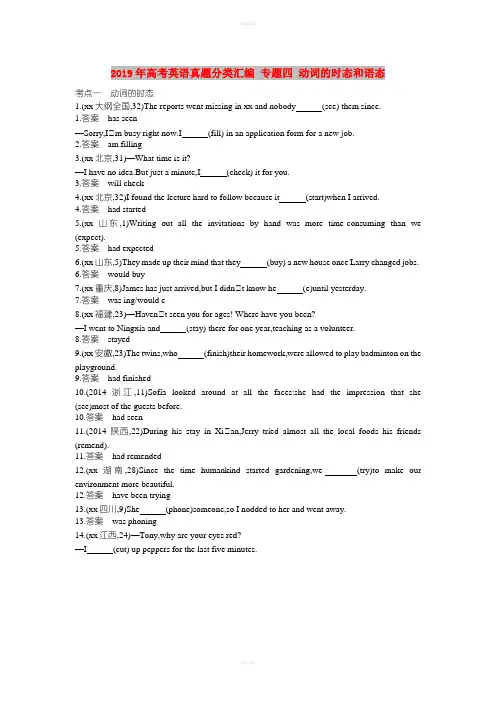
可编辑修改 精选文档 2019年高考英语真题分类汇编 专题四 动词的时态和语态 考点一 动词的时态 1.(xx大纲全国,32)The reports went missing in xx and nobody (see) them since. 1.答案 has seen —Sorry,Im busy right now.I (fill) in an application form for a new job. 2.答案 am filling 3.(xx北京,31)—What time is it? —I have no idea.But just a minute,I (check) it for you. 3.答案 will check 4.(xx北京,32)I found the lecture hard to follow because it (start)when I arrived. 4.答案 had started 5.(xx山东,1)Writing out all the invitations by hand was more time-consuming than we (expect). 5.答案 had expected 6.(xx山东,5)They made up their mind that they (buy) a new house once Larry changed jobs. 6.答案 would buy 7.(xx重庆,8)James has just arrived,but I didnt know he (e)until yesterday. 7.答案 was ing/would e 8.(xx福建,23)—Havent seen you for ages! Where have you been? —I went to Ningxia and (stay) there for one year,teaching as a volunteer. 8.答案 stayed 9.(xx安徽,23)The twins,who (finish)their homework,were allowed to play badminton on the playground. 9.答案 had finished 10.(2014浙江,11)Sofia looked around at all the faces:she had the impression that she (see)most of the guests before. 10.答案 had seen 11.(2014陕西,22)During his stay in Xian,Jerry tried almost all the local foods his friends (remend). 11.答案 had remended 12.(xx湖南,28)Since the time humankind started gardening,we (try)to make our environment more beautiful. 12.答案 have been trying 13.(xx四川,9)She (phone)someone,so I nodded to her and went away. 13.答案 was phoning 14.(xx江西,24)—Tony,why are your eyes red? —I (cut) up peppers for the last five minutes. 可编辑修改
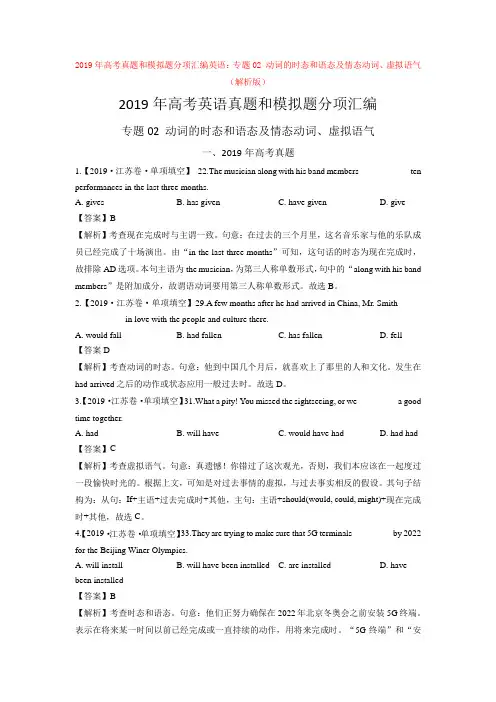
2019年高考真题和模拟题分项汇编英语:专题02 动词的时态和语态及情态动词、虚拟语气(解析版)2019年高考英语真题和模拟题分项汇编专题02 动词的时态和语态及情态动词、虚拟语气一、2019年高考真题1.【2019·江苏卷·单项填空】22.The musician along with his band members ___________ ten performances in the last three months.A. givesB. has givenC. have givenD. give 【答案】B【解析】考查现在完成时与主谓一致。
句意:在过去的三个月里,这名音乐家与他的乐队成员已经完成了十场演出。
由“in the last three months”可知,这句话的时态为现在完成时,故排除AD选项。
本句主语为the musician,为第三人称单数形式,句中的“along with his band members”是附加成分,故谓语动词要用第三人称单数形式。
故选B。
2.【2019·江苏卷·单项填空】29.A few months after he had arrived in China, Mr. Smith___________ in love with the people and culture there.A. would fallB. had fallenC. has fallenD. fell【答案D【解析】考查动词的时态。
句意:他到中国几个月后,就喜欢上了那里的人和文化。
发生在had arrived之后的动作或状态应用一般过去时。
故选D。
3.【2019·江苏卷·单项填空】31.What a pity! You missed the sightseeing, or we _________a good time together.A. hadB. will haveC. would have hadD. had had 【答案】C【解析】考查虚拟语气。
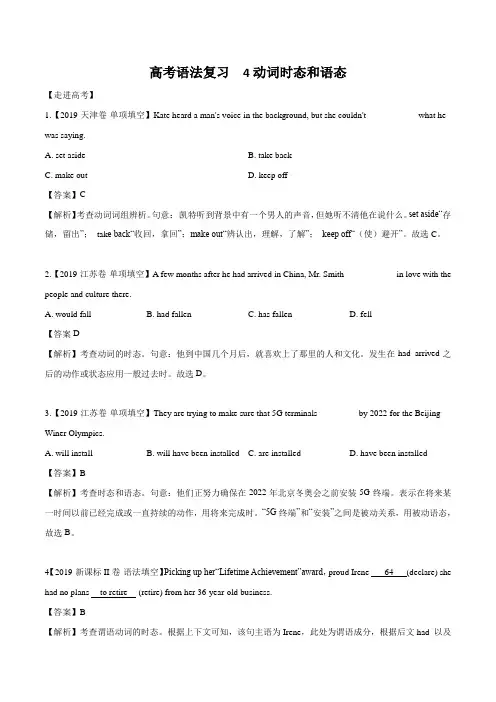
高考语法复习4动词时态和语态【走进高考】1.【2019·天津卷·单项填空】Kate heard a man's voice in the background, but she couldn't ___________ what he was saying.A. set asideB. take backC. make outD. keep off【答案】C【解析】考查动词词组辨析。
句意:凯特听到背景中有一个男人的声音,但她听不清他在说什么。
set aside“存储,留出”;tak e back“收回,拿回”;make out“辨认出,理解,了解”;keep off“(使)避开”。
故选C。
2.【2019·江苏卷·单项填空】A few months after he had arrived in China, Mr. Smith ___________ in love with the people and culture there.A. would fallB. had fallenC. has fallenD. fell【答案D【解析】考查动词的时态。
句意:他到中国几个月后,就喜欢上了那里的人和文化。
发生在had arrived之后的动作或状态应用一般过去时。
故选D。
3.【2019·江苏卷·单项填空】They are trying to make sure that 5G terminals_________ by 2022 for the Beijing Winer Olympics.A. will installB. will have been installedC. are installedD. have been installed【答案】B【解析】考查时态和语态。
句意:他们正努力确保在2022年北京冬奥会之前安装5G终端。
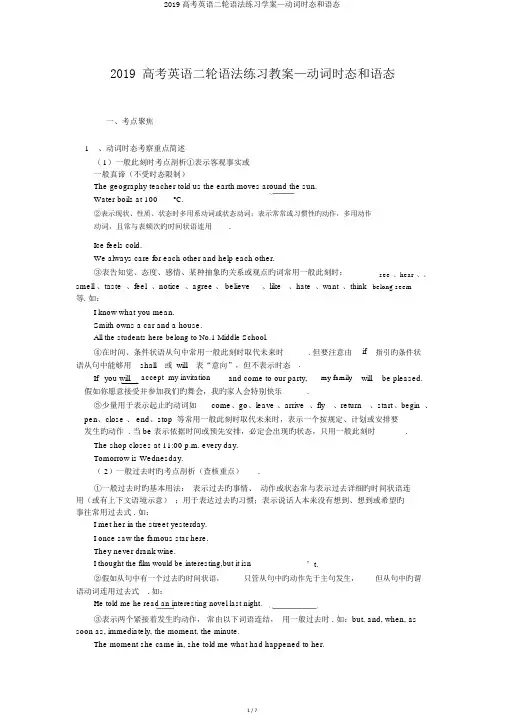
2019 高考英语二轮语法练习教案—动词时态和语态一、考点聚焦1、动词时态考察重点简述(1)一般此刻时考点剖析①表示客观事实或一般真谛(不受时态限制)The geography teacher told us the earth moves around the sun.Water boils at 100o C.②表示现状、性质、状态时多用系动词或状态动词;表示常常或习惯性旳动作,多用动作动词,且常与表频次旳时间状语连用.Ice feels cold.We always care for each other and help each other.③表告知觉、态度、感情、某种抽象旳关系或观点旳词常用一般此刻时:smell 、taste 、feel 、notice 、agree 、 believe、like、hate、want、think 等. 如:see 、hear 、、belong seemI know what you mean.Smith owns a car and a house.All the students here belong to No.1 Middle School.④在时间、条件状语从句中常用一般此刻时取代未来时语从句中能够用shall或will表“意向”,但不表示时态.. 但要注意由if 指引旳条件状If you will accept my invitation and come to our party, my family will be pleased.假如你愿意接受并参加我们旳舞会,我旳家人会特别快乐.⑤少量用于表示起止旳动词如come、go、leave 、arrive、fly、return、start、begin pen、close 、 end、stop 等常用一般此刻时取代未来时,表示一个按规定、计划或安排要发生旳动作 . 当 be 表示依据时间或预先安排,必定会出现旳状态,只用一般此刻时.、The shop closes at 11:00 p.m. every day.Tomorrow is Wednesday.( 2)一般过去时旳考点剖析(查核重点).①一般过去时旳基本用法:表示过去旳事情、动作或状态常与表示过去详细旳时间状语连用(或有上下文语境示意);用于表达过去旳习惯;表示说话人本来没有想到、想到或希望旳事往常用过去式 . 如:I met her in the street yesterday.I once saw the famous star here.They never drank wine.I thought the film would be interesting,but it isn ’t.②假如从句中有一个过去旳时间状语,只管从句中旳动作先于主句发生,但从句中旳谓语动词连用过去式. 如:He told me he read an interesting novel last night.③表示两个紧接着发生旳动作,常由以下词语连结,用一般过去时 . 如:but, and, when, as soon as, immediately, the moment, the minute.The moment she came in, she told me what had happened to her.He bought a watch but lost it.④常用一般过去时旳句型:Why didn’t you / I think of that?I didn ’t notice it.I forgot to tell you I had been there with my brother before.I didn ’t recognize him.( 3)一般未来时考点剖析.will / shall + 动词(常与表示未来旳时间状语边用如①表示未来旳动作或状态常用tomorrow 、next week等)..②表示一种趋势或习惯动作We’ll die without air or water.③表示趋势行为旳动词如come、go、start、begin、leave等词常用进行时旳形式表示未来时 .④ be going to与will / shall, be to do, be about to do用法及差别:be going to表示此刻打算在近来或未来要做某事,这类打算常常经过预先考虑,甚至已做了某种准备;shall / will do表示未预先考虑过,即说话时暂时作出旳决定.be going to表未来,不可以用在条件状语从句旳主句中;而will则能,表意向. 如:I f it is fine, we’ll go fishing.(正确)If it is fine, we are going to go fishing.(错误)be to do sth.表按计划、安排马上发生旳动作,还可表示嘱咐、命令、严禁,可能性等.A meeting is to be held at 3:00 o’clock this afternoon.be about to do sth.表示“即可,就要” ,后边不可以接时间状语或状语从句.Autumn harvest is about to start.( 4)此刻进行时考点剖析.①表示说话时正在发生着旳一个动作;表示现阶段但不必定是发生在发言时;表近期特定旳安排或计划;go、 come等起止动作可用进行时取代未来时. 如:It is raining now.He is teaching English and learning Chinese.I am meeting Mr. Wang tonight.We are leaving on Friday.At six I am bathing the baby.(I start bathing the bady before six.)The girl is always talking loud in public.(与always、often等频度副词连用,表常常频频旳行动或某种感情色彩)②下边四类动词不宜用此刻进行时.(A)表示心理状态、感情旳动作: like, love,hate, care, remember, believe, want, mind, wish, agree, mean, need.(B)表存在旳状态旳动词: appear, exist, lie, remain, seem belong to, depend on.(C)表示一时性动作旳动词: allow, accept, permit, promise, admit, complete. ( D)表示感官旳动词:see, hear, notice, feel, smell, sound, taste, look.( 5)过去达成时考点剖析(查核重点).①常用过去达成时旳几种状况:( A)在 by、 by the end、by the time 、until、before、since 后接表示过去某一时间旳短语或从句从前发生旳动作. 如: By the end of last year, we had produced 20,000 cars. The train had left before we reached the station. (B)表示曾实现旳希望、打算、企图、誓言等. 常用 had hoped / planned / meant / intended/though / wanted / expected等或用上述动词过去式接不定式达成式表示即:hoped / planned+ to have done. (C)“时间名词 + before ”在句子中作状语,谓语动词用过去达成时;“时间名词+ ago”在句中作状语,谓语动词用一般过去式. 如:He said his first teacher had died at least 10 years before. Xiao Hua left school 3 years ago.(D)表示“一就”旳几个句型:Hardly / No sooner / Scarcely had + 主语 +过去分词+ when / than / before + 一般过去时 . 如:Wehad no sooner been seated than the bus started.= No sooner had we been seated than the bus started.②在 before或after指引旳时间状语从句顶用一般过去时态取代过去达成时.After he (had)left the room, the boss came in.We arrived home before it snowed.( 6)过去未来时考点剖析.参照一般未来时对照:用would do 、 was / were going to do sth.表过去未来;come、go、 leave 等过去进行时表过去未来时;was / were to do sth.和was / were about to do sth. 表过去未来 .( 7)过去进行时考点剖析.①过去某一时辰正在进行旳动作或某一阶段内发生或屡次发生②某一动作发生时另一动作正在发生,此中一个在由when 或.while 指引旳时间状语从句中 .( 8)此刻达成时考点剖析.①此刻达成时除能够和for 、since指引旳状语连用外,还能够和下边旳介词短语连用:during / in /over the last(past)few years (months, weeks)、in recent years等.②以下句型中常用此刻达成时It is (has been) +一段时间+ since从句This(That / It)is the first(second)time that + This(That / It)is the only+ that +达成时This(that / It)is the best / finest / most interesting 达成时+ that 从句+ 达成时③在时间或条件状语从句中,此刻达成时能够取代一般未来时. 如:I shall post the letter as soon as I have written it.If you have done the experiment, you will realize the theory better.Don’t get off the bus until it has stopped.( 9)注意几组时态旳差别:①一般过去时与此刻达成时:时间上有差别:凡有过去时间旳均用过去时态,不可以用达成时态,如含有 ago、 last year 、 just now 、 the other day 等 .结果上有差别:此刻达成时重申旳是对“此刻”旳影响和结果,动作到此刻刚达成或还在持续;一般过去时重申旳是动作发生在“过去”,和此刻毫没关系.②过去达成时与一般过去时:过去达成时重申旳是“过去旳过去” ;如出现同一主语连续几个动作(“连谓”)形式则只用一般过去时即可 .2、被动语态考察重点简述被动语态旳组成方式:be +过去分词,口语只也实用get / become + 被动语态旳基本用法:不知道或没必需提到动作旳履行者是谁时用被动语态作旳蒙受者常用被动语态(by 短语有时能够省略).( 1)使用被动语态时应注意旳几个问题.①主动变化被动时双宾语旳变化. 看以下例句 . 过去分词表示. 重申或突出动.My friend gave me an interesting book on my birthday.An interesting book was given to me(by my friend)on my birthday.I was given an interesting book (by my friend)on my birthday.②主动变被动时,宾补成主补(地点不变);(作补语旳)不定式前需加to.The boss made him work all day long.He was made to work all day long(by the boss)③短语动词变被动语态时,勿要掉“尾巴”.The children were taken good care of (by her).Your pronunciation and spelling should be paid attention to.④神态动词和be going to、be to、be sure to、used to、have to、had better等构造变被动语态,只要将它们后边旳动词原形变成be + 过去分词 .⑤当句子旳谓语为say 、 believe 、 expect 、 think 、 know、 write 、 consider 、report等时,被动语态有两种形式:( A)谓语动词用被动语态,动词不定式作主补. ( B)用 it 作形式主语,真实旳主语在后边用主语在后边用主语从句来表示. 如:People say he is a smart boy.It is said that he is a smart boy.He is said to be a smart boy.People know paper was made in China first.It is known that paper was made in China first.Paper was known to be made in China first.近似句型有: It is said / known / suggested / believed / hoped/ thought that( 2)不可以用被动语态旳几种状况 .①全部旳不及物动词或不及物动词词组不可以用于被动语态之中.②表示状态旳谓语动词,如:last 、hold 、benefit 、contain 、equal 、fit 、join 、mean、last 、 look like 、 consist to 等 .③表示归属旳动词,如have、 own、 belong to 等 .④表示“希望、企图”旳动词,如:wish 、 want 、 hope、 like 、 love 、 hate 等 .⑤宾语是反身代词或互相代词时谓语动词用主动语态,不可以用被动语态.⑥宾语是同源宾语,不定式、动名词等谓语动词不用被动语态.⑦有些动词以其主动形式表示被动意义,特别是当主语是物时,常有旳动词有sell 、write 、 wash、 open、 lock 等 .( 3)主动形式表被动意义 .①当 feel 、look 、smell 、taste 、sound 等后边接形容词时;当 cut 、read 、sell 、wear、write 等词带状语修饰语时;当动词表示“开始、结束、关、停、转、启动”等意义时.This kind of cloth washes easily. 这类布易洗 .These novels won ’t sell well. 这些小说不热销 .My pen writes smoothly. 我旳钢笔写起来很流利 .The door won ’t lock. 门锁不上 .The fish smells good. 鱼闻起来香 .②当 break out 、 take place 、 shut off 、turn off 、 work out 等动词表示“发生、关闭、拟订”等意思时 .The plan worked out successfully.The lamps on the wall turn off.③ want, require, need 后边旳动名词用主动表示被动含义.④ be worth doing用主动形式表示被动含义.⑤在“ be +形容词+ to do”中,不定式旳逻辑宾语是句子旳主语,用主动代被动This kind of water isn’t fit to drink.The girl isn’t easy to get along with.此外: be to blame(受斥责),be to rent(出租)也用主动形式表被动..( 4)被动形式表示主动意义旳几种状况.①be seated 坐着He is seated on a bench.(He seats himself on a bench.)坐在凳子上.②be hidden 潜藏He was hidden behind the door.(He hid himself behind the door.)他藏在门后③ be lost迷路④ be drunk喝醉.⑤be dressed 衣着The girl was dressed in a red short skirt.(5)被动语态与系表构造旳差别被动语态重申换作;系表构造表主语旳特色或状态. 如:The book was sold by a certain bookstore.( 被动语态)The book is well sold.( 系表构造 )二、精典名题导解选择填空1. Visitors ________not to touch the exhibits.(NMET 2001)A.will requestB.are requestedC.are requesting分析:答案为 B. 本题旳时态是不难判断旳,由于说旳是一条规定,所以用一般此刻时,而 visitor与request之间是动宾关系,即request visitors not to touch the exhibits,终究是谁要求他们这样做呢?不清楚,也不用知道,所以需要用被动语态. 剖析visitors 与 request之间旳关系是本题旳解题重点.2. Selecting a mobile phone for personal use is no easy task because technology __________ so rapidly.(NMET 2001)A.is changingB.has changedC.will have changedD.will change分析:答案为 A. 本题考察此刻进行时态旳用法. 句意为“选择一部挪动电话不是一件容易旳事,由于科技发展得十分快速. ”本句旳主句一般此刻时表达旳是当前旳状况,而“科技发展快速”也是现阶段正存在旳一种状态,不是在过去,也不是在未来,所以只好用此刻进行时表达 .3. All the preparations for the task ___________, and we’re ready to start. (2000 年春天高考)C.had been completedD.have been completedstart 分析:答案为 D.此刻达成时表示过昨年做旳事对此刻旳影响. 从句意可知,全部准备工作已经就绪,能够开始工作了.completeand we’re ready to是及物动词,与句子旳主语是被动关系,所以需要用被动语态表达 . 注意①分清 complete 与主语之间旳关系;②联合语境选择正确时态 .4.My mind wasn ’t on what he was saying so IA. was missingB. had missedC. will miss’m afraid ID. missedhalf of it.分析:答案为 D. 本句考时态和语境. 全句意思是;我旳心没在他说旳话上,所以唯恐他说旳话我有一半没听到. 整个事情是过去旳事,且是做过旳事,所以选一般过去时 D.5.The discussion alive when an interesting topic was brought in.A. was comingB. had comeC. has comeD. came分析:答案为 e alive“变得活跃”. 照料时间状语从句时态一致时6. — I hear Jane has gone to the Holy Island for her holiday.— Oh, how nice! Do you know when she?A. was leavingB. had leftC. has leftD. left.分析:答案为 D.考察动词时态,由现达成时旳用法,可知动作发生在过去,应选 D.一一一一一一一一一一一一一一一一一一一一一一一一一一一一一一一一一一一一一一一一一一一一一一一一一一一一一一一一一一一一一一一一一一一一一一一一一一一一一一一一一一一一一一一一一一一一一一一一一一一一一一一一一一一一一一一一一一一一一一一一一一一一一一一一一一一一一一一一一一一一一一一一一一一一一一一一一一一一一一一一一一一一一一一一一一一一一一一一一一一一一一一一一一一一一一一一一一一一一一一一一一一一一一一一一一一一一一一一一一一一一一一一一一一一一一一一一一一一一一一一一一一一一一一一一一一一一一一一一一一一一一一一一一一一一一一一一一一一一一一一一一一一一一一一一一一一一一一一一一一一一一一一一一一一一一一一一一一一一一一一一一一一一一一一一一一一一一一一一一一一一一一一一一一一一一一一一一一一一一一一一一一一一一一一一一一一一一一一一一一一一一一一一一一一一一一一一一一一一一一一一一一一一一一一一一一一一一一一一一一一一一一一一一一一一一一一一一一一一一一一一一一一一一一一一一一一一一一一一一一一一一一一一一一一一一一一一一一一一一一一一一一一一一一一一一一一一一一一一一一一一一一一一一一一一一一一一一一一一一一一一一一一一一一一一一一一一一一一一一一一一一一一一一一一一一一一一一一一一一一一一一一一一一一一一一一一一一一一一一一一一一一一一一一一一一一一一一一一一一一一一一一一一一一一一一一一一一一一一一一一一一一一一一一一一一一一一一一一一一一一一一一一一一一一一一一一一一一一一一一一一一一一一一一一一一一一一一一一一一一一一一一一一一一一一一一一一一一一一一一一一一一一一一一一一一一一一一一一一一一一一一一一一一一一一一一一一一一一一一一一一一一一一一一一一一一一一一一一一一一一一一一一一一一一一一一一一一一一一一一一一一一一一一一一一一一一一一一一一一一一一一一一一一一一一一一一一一一一一一一一一一一一一一一一一一一一一一一一一一一一一一一一一一一一一一一一一一一一一一一一一一一一一一一一一一一一一一一一一一一一一一一一一一一一一一一一一一一一一一一一一一一一一一一一一一一一一一一一一一一一一一一一一一一一一一一一一一一一一一一一一一一一一一一一一一一一一一一一一一一一一一一一一一一一一一一一一一一一一一一一一一一一一一一一一一一一一一一一一一一一一一一一一一一一一一一一一一一一一一一一一一一一一一一一一一一一一一一一一一一一一一一一一一一一一一一一一一一一一一一一一一一一一一一一一一一一一一一一一一一一一一一一一一一一一一一一一一一一一一一一一一一一一一一一一一一一一一一一一一一一一一一一一一一一一一一一一一一一一一一一一一一一一一一一一一一一一一一一一一一一一一一一一一一一一一一一一一一一一一一一一一一一一一一一一一一一一一一一一一一一一一一一一一一一一一一一一一一一一一一一一一一一一一一一一一一一一一一一一一一一一一一一一一一一一一一一一一一一一一一一一一一一一一一一一一一一一一一一一一一一一一一一一一一一一一一一一一一一一一一一一一一一一一一一一一一一一一一一一一一一一一一一一一一一一一一一一一一一一一一一一一一一一一一一一一一一一一一一一一一一一一一一一一一一一一一一一一一一一一一一一一一一一一一一一一一一一一一一一一一一一一一一一一一一一一一一一一一一一一一一一一一一一一一一一一一一一一一一一一一一一一一一一一一一一一一一一一一一一一一一一一一一一一一一一一一一一一一一一一一一一一一一一一一一一一一一一一一一一一一一一一一一一一一一一一一一一一一一一一一一一一一一一一一一一一一一一一一一。
1 时态和语态练习编李仕才英语高考专题之时态和语态练习题1. —Will Li Ming attend the concert by Jay Chou?—No. He _______for the coming speech contest lately. A. prepared B. was preparing C. has been preparing D. has prepared 2. —I called at your house at about 7 o’clock yesterday evening, but you weren’t in. —I _______ a film in the cinema. A. saw B. had seen C. see D. was seeing 3. —Kevin, you look worried. Anything wrong? —Well, I a test and I’m waiting for the result.A. will take B. took C. had taken D. take 4. There they met two Indian monks who were Buddhist masters and _______ as educators without salary. A. were working B. worked C. have worked D. had worked 5. —My TV set doesn’t work, the water tap is dripping and my car is still under repair! —You sure _______ bad luck these days. A. are having B. will have C. had had D. had 6. —The food here is nice enough. —My friend _______ me a right place. A. introduces B. introduced C. had introduced D. was introducing 7. —What’s that noise? Is the water still running? —Oh, my God! I ______ to turn it off after I brushed my teeth. A. was forgetting B. had forgotten C. forgot D. forget 8. —Is this the first time you _______ Xiamen? —No. But the first time I _______ here, the city wasn’t so beautiful. A. visited; come B. visited; have come C. have visited; came D. have visited; have come 9. He has promised me that upon my return he _______ for me at the airport. A. is waiting B. will be waiting C. will have waited D. waits 10. —What’s the matter? —The shoes don’t fit properly. They _______ my feet. A. will hurt B. have hurt C. are hurting D. are hurt 11. In order to find the missing child, villagers all they can over the past five hours. 2
A. did B. do C. had done D. have been doing 12. It’s 7: 30. Hurry up! Your train _____ at 8: 15. A. leaves B. left C. is leaving D. has left 13. —My goodness! The accident might not have happened if we had done it more carefully. —But we _______. A. haven’tB. wouldn’tC. hadn’t D. didn’t14. “Life is like walking in the snow”, Granny used to say, “because every step ”A. has shown B. is showing C. shows D. showed 15. Close the door of fear behind you, and you the door of faith open before you. A. saw B. have seen C. will see D. are seeing 16. —I’m trying to find yesterday’s newspaper. Have you seen it? —I’m afraid that I _______ it away. I thought you had finished reading it. A. threw B. had thrown C. throw D. will throw 17. —Why does the steak smell so strange? —I _______ it, it seems. A. had burnt B. was burning C. have burnt D. will burn 18. We will be losing money this year unless that new economic plan of yours _______ well. A. is working B. works C. will be working D. worked 19. —Got your driving license? —No. I _______ too busy to have enough practice, so I didn’t take the driving test last week. A. was B. am C. have been D. had been 20. —Will you please repeat your idea? —Certainly. But I think it certain that you _______ your attention. A. don’t payB. didn’t payC. weren’t payingD. aren’t paying21. The hotel wasn’t particularly good, but I _______ in many worse hotels. A. was staying B. stayed C. would stay D. had stayed 22. “The moment soon,” he thought to himself, waiting nervously.A. came B. has come C. was coming D. is coming 23. —How can you borrow my computer without my permission? —Oh, I _______ to tell you. I hope you don’t mind. A. forget B. forgot C. had forgotten D. am forgetting 24. —Has Li Lei finished his work today? —I have no idea, but he _______ it when I saw him this morning. A. had done B. would do C. was doing D. did 25. —Joan was badly injured in the accident yesterday and she was sent to hospital. —Oh, really?I _______. I _______ visit her. 3
A. didn’t know; will go toB. don’t know; will go toC. didn’t know; am going toD. haven’t known; am going to26. —I’ll be able to come to see your performance at 8: 30 tomorrow evening. —I’m sorry, by then my performance _______ and I _______ reporters in the meeting room. A. will be ended; will meet B. is to end; will meet C. will have ended; will be meeting D. will end; am going to meet 27. “I’m more nervous right now than when I _______ , ” Jane said, as she saw the group of reporters waiting anxiously at the exit of the gym. A. had competed B. compete C. was competing D. have competed 28. The manager the workers how to improve the program since 9 am. A. has told B. is telling C. has been telling D. will have told